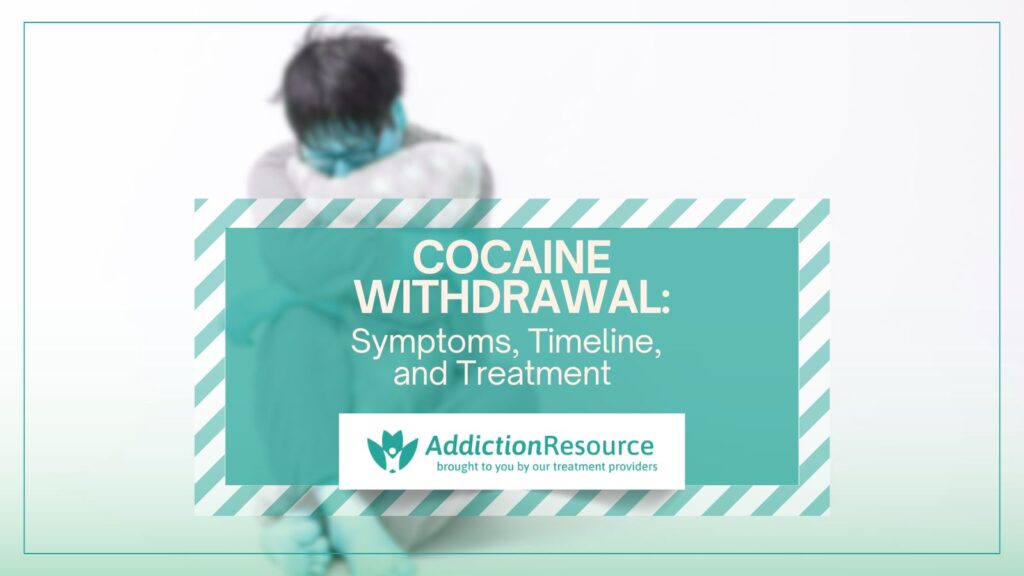
Cocaine withdrawal occurs when an individual stops using cocaine after prolonged use, leading to a range of physical and psychological symptoms. Cocaine, a powerful stimulant, affects the brain’s dopamine system, leading to intense feelings of euphoria during use. However, discontinuing cocaine use triggers withdrawal as the body readjusts to functioning without the drug’s stimulating effects.
The main symptoms of cocaine withdrawal include fatigue, depression, intense cravings, anxiety, irritability, insomnia, and physical discomfort. These symptoms begin within hours of stopping cocaine and last for several weeks, making the withdrawal process challenging.
Treatment for cocaine withdrawal involves a combination of detoxification, behavioral therapies, and support groups. Medical supervision during detox helps manage withdrawal symptoms, while therapies like Cognitive Behavioral Therapy (CBT) address the psychological aspects of addiction. Support groups and long-term rehab programs further aid in sustaining recovery.
Table Of Contents:
What is Cocaine Withdrawal?
Cocaine withdrawal is the physical and psychological symptoms experienced when a person who is dependent on cocaine stops or reduces its use. Withdrawal, in general, occurs as the body and brain attempt to rebalance after the removal of a substance that has altered normal functioning. Cocaine, a potent stimulant, disrupts the brain’s dopamine pathways, leading to intense cravings and emotional disturbances when use ceases.
The symptoms of withdrawal vary depending on the type of cocaine used, including powdered cocaine, crack cocaine, or less common liquid forms. Crack cocaine, for instance, produces more rapid and intense withdrawal due to its faster absorption and shorter half-life. Common withdrawal symptoms include fatigue, depression, anxiety, irritability, vivid nightmares, and an overwhelming urge to use the drug again.
Research by the Substance Abuse and Mental Health Services Administration (SAMHSA) indicates that the withdrawal phase lasts from 3 days to weeks, depending on the individual’s usage pattern, with cravings persisting much longer in some cases. Studies, such as those by the National Institute on Drug Abuse (NIDA), highlight the severity of withdrawal and the imperative need for medical and psychological support during recovery. Addressing withdrawal is a necessary first step in treating cocaine addiction and preventing relapse.
What are the Causes of Cocaine Withdrawal?
The causes of cocaine withdrawal include alterations in brain chemistry, physical and psychological dependence, and individual usage factors. Cocaine dramatically increases dopamine levels in the brain, creating a surge of euphoria. Over time, this disrupts natural dopamine production and receptor sensitivity, leaving the brain unable to regulate mood and reward without the drug, as studied by the National Institute on Drug Abuse (NIDA) 2021, Cocaine Drug Facts.” Dependence develops as the body and mind adapt to cocaine’s presence, leading to withdrawal symptoms when it is removed. The severity of withdrawal symptoms is also influenced by usage patterns, with higher doses and prolonged use resulting in more intense and prolonged withdrawal experiences
Pre-existing mental health conditions, such as anxiety or depression, exacerbate withdrawal symptoms, making the process more challenging. Crack cocaine, due to its rapid absorption and shorter duration of action, leads to more intense withdrawal compared to powdered cocaine. Studies from the National Institute on Drug Abuse (NIDA) emphasize that withdrawal is a multifaceted process, shaped by both the physiological impacts of the drug and the psychological challenges of breaking dependence. Addressing these underlying causes through medical and psychological interventions is necessary for successful recovery.
How Does the Body Detox from Cocaine?
The body detoxes from cocaine through several physiological processes. Cocaine is metabolized primarily in the liver, where it is broken down into inactive compounds such as benzoylecgonine, which are then excreted by the kidneys through urine. This elimination begins within hours of the last dose and continues for several days, depending on the frequency and amount of cocaine use.
According to a study by Valente M.J., Carvalho F., Bastos M., de Pinho P.G., et al. 2012, titled “Carvalho M. Contribution of oxidative metabolism to cocaine-induced liver and kidney damage,” the body detoxes from cocaine through liver metabolism and excretion by the kidneys. Cocaine is primarily broken down into inactive metabolites like benzoylecgonine (BE) and ecgonine methyl ester (EME), which are eliminated through urine. A small fraction undergoes further metabolism by liver enzymes, producing norcocaine (NCOC), a toxic compound that crosses the blood-brain barrier and increases organ stress. This process highlights the liver’s role in neutralizing cocaine’s effects, but it also underscores the potential for damage during detoxification.
In the brain, dopamine levels and receptor sensitivity start to stabilize as the drug’s effects wear off. However, this recovery process is gradual and involves intense cravings and mood disturbances due to the brain’s previous overreliance on cocaine for dopamine surges.
During detox, withdrawal symptoms such as fatigue, depression, irritability, and disturbed sleep occur as the body adjusts to the absence of cocaine. Medical and psychological support during this phase helps manage symptoms and reduce the risk of relapse. Effective detox protocols include hydration, nutrition, and symptomatic relief under medical supervision, especially for heavy or long-term users.
What are the Symptoms of Cocaine Withdrawal?
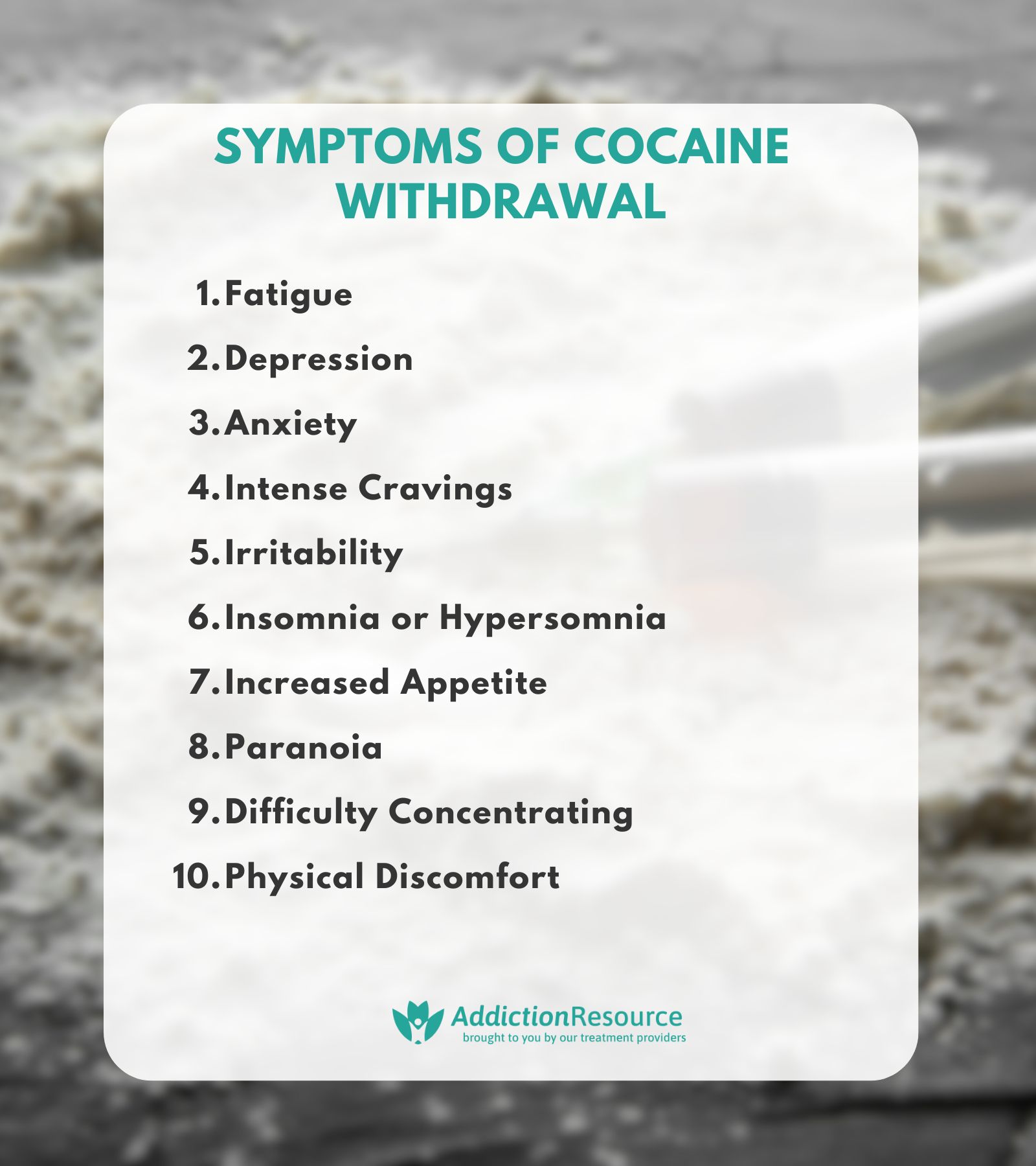
The symptoms of cocaine withdrawal are fatigue, depression, anxiety, intense cravings, irritability, insomnia or hypersomnia, increased appetite, paranoia, difficulty concentrating, and physical discomfort like muscle aches. These symptoms arise as the body and brain attempt to recover from cocaine’s disruptive effects on neurotransmitter systems, particularly dopamine.
Symptoms of cocaine withdrawal are as follows:
- Fatigue: Fatigue is a physical symptom that occurs due to the depletion of dopamine and other neurotransmitters after chronic overstimulation. It reflects the brain’s exhaustion following the hyperactivity induced by cocaine. This symptom is common and persists for several days, according to a study by Moeller SJ et al. 2012, titled “Dopaminergic involvement during mental fatigue in health and cocaine addiction.”
- Depression: Depression is a psychological symptom that results from a sudden drop in dopamine levels, causing a lack of pleasure and motivation. This ranges from mild to severe and is one of the most challenging withdrawal symptoms. A study by Cottler LB et al. 1993, titled “Subjective reports of withdrawal among cocaine users: recommendations for DSM-IV,” indicates that up to 41% of individuals in cocaine withdrawal report depression severe enough to require medical intervention.
- Anxiety: Anxiety arises due to imbalances in brain chemistry, particularly involving the overstimulation and subsequent rebound of stress hormones like norepinephrine. This psychological symptom is moderate to severe and exacerbates cravings during withdrawal, as studied by El Hage C et al. 2012, in “Enhanced anxiety observed in cocaine withdrawn rats is associated with altered reactivity of the dorsomedial prefrontal cortex.”
- Intense Cravings: Cravings are psychological and behavioral symptoms stemming from the brain’s memory of cocaine-induced euphoria and its conditioned response to triggers. This is a hallmark of addiction and withdrawal, significantly contributing to relapse risks. Studies by Health Direct suggest cravings are strongest during the first few weeks.
- Irritability: Irritability is a psychological and behavioral symptom caused by dopamine imbalances and heightened stress responses. It is common and moderate, although severe cases require therapy.
- Insomnia or Hypersomnia: Sleep disturbances, either insomnia or excessive sleep, occur as the brain adjusts to normalized neurotransmitter activity. Clinical research by Kowatch RA et al. 1992, titled “Electroencephalographic sleep and mood during cocaine withdrawal,” supports the prevalence of these physical symptoms in early withdrawal stages. The study investigated insomnia as a symptom of cocaine withdrawal by monitoring the sleep patterns of nine patients undergoing treatment. It found that insomnia is a persistent symptom of cocaine withdrawal. In the first week, patients showed disrupted sleep with shortened REM latency, increased REM activity, and prolonged total sleep time. By the third week, insomnia patterns emerged, including long sleep latency, frequent awakenings, and poor sleep efficiency. These findings suggest that while some withdrawal symptoms like cravings and mood disturbances improve within weeks, insomnia lingers and requires specific management strategies.
- Increased Appetite: Increased appetite, a physical symptom, reflects the body’s recovery from appetite suppression caused by cocaine. This is a common symptom during withdrawal and helps restore nutritional balance, though it leads to overeating.
- Paranoia: Paranoia, a psychological symptom, is less common but occurs in individuals with prolonged use. It stems from dopamine dysregulation in areas of the brain associated with perception and fear. Paranoia occurs in 68% to 84% of patients using cocaine, as studied by Satel SL, Southwick SM, and Gawin FH. et al. 1992, in “Clinical features of cocaine-induced paranoia.” Cocaine-induced paranoia is transient, lasting a few hours or as long as days or weeks.
- Difficulty Concentrating: This psychological symptom results from cognitive impairments caused by disrupted dopamine pathways. It is moderate and lasts weeks or months after withdrawal.
- Physical Discomfort (e.g., muscle aches): Physical discomfort, including muscle aches, is a somatic symptom resulting from the physical strain and altered muscle tension caused by cocaine use and withdrawal. This symptom is usually mild to moderate.
What is the Timeline of Cocaine Withdrawal?
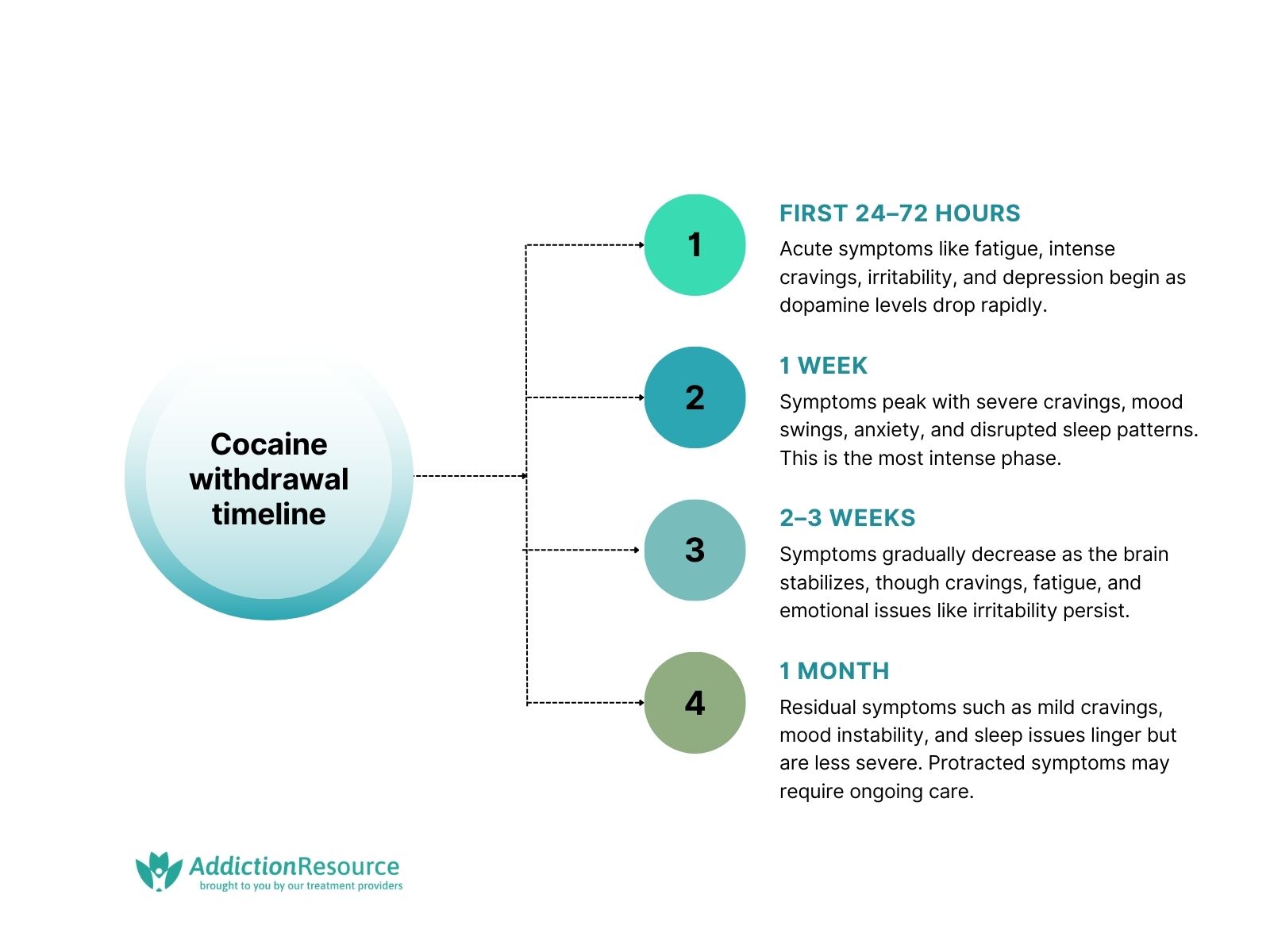
The cocaine withdrawal timeline includes the initial phase, peak phase, sub-acute phase, and prolonged withdrawal, each marked by specific symptoms as the body and brain adjust to the absence of cocaine. The duration and severity of withdrawal depend on factors such as usage frequency, dosage, and individual health conditions.
The cocaine withdrawal timeline is explained as follows:
- First 24–72 Hours: Acute symptoms begin as cocaine levels drop rapidly. Common symptoms include fatigue, intense cravings, irritability, and depression as the brain starts adjusting to reduced dopamine stimulation. These symptoms are usually intense but manageable with support.
- 1 Week: This phase marks the peak of withdrawal symptoms. Cravings become most severe, accompanied by mood swings, anxiety, and disrupted sleep patterns such as insomnia or hypersomnia. The physical and psychological impact is at its highest during this time.
- 2–3 Weeks: Symptoms gradually decrease as the brain’s dopamine system begins stabilizing. While cravings and fatigue persist, they become less intense. Emotional symptoms like irritability and difficulty concentrating continue to linger.
- 1 Month: Residual symptoms like mild cravings, mood instability, and sleep disturbances persist but are less severe. In some cases, protracted withdrawal symptoms last longer, requiring ongoing care and support through therapy and lifestyle adjustments.
What Factors Influence the Cocaine Withdrawal Process?
The factors that influence the cocaine withdrawal process are duration of use, dosage and frequency, ingestion method, individual metabolism, and more. These variables dictate the intensity and length of withdrawal symptoms by affecting how the brain and body recover from dependency.
The factors that influence the cocaine withdrawal process are as follows:
- Duration of Cocaine Use: The longer a person uses cocaine, the more ingrained the dependency becomes in their brain’s reward pathways. Chronic use leads to more significant alterations in dopamine receptor function, intensifying withdrawal symptoms and prolonging recovery. Long-term users experience protracted withdrawal, including persistent cravings and mood instability for months. Chronic cocaine use is defined as use by any route for at least 6 months, administered at least 4 times a month.
- Dosage and Frequency of Use: Higher dosages and more frequent usage increase the body’s tolerance to cocaine, resulting in more severe withdrawal symptoms. Heavy use also amplifies physical and psychological stress during detox, leading to intense cravings and mood swings, as studied by Bolla KI et al. 1998, in “The Neuropsychiatry of Chronic Cocaine Abuse.”
- Method of Ingestion: Ingesting cocaine by smoking (crack cocaine) or injecting results in faster and more potent effects compared to snorting, leading to stronger dependencies, according to a study by Wise RA, Kiyatkin EA. et al. 2011, titled “Differentiating the rapid actions of cocaine.” This method of use is associated with a higher risk of severe withdrawal symptoms, including intense cravings and agitation.
- Individual Metabolism: Metabolic rates affect how quickly cocaine and its metabolites are eliminated from the body. Individuals with slower metabolisms experience prolonged withdrawal symptoms as the drug’s effects linger longer in their system.
- Co-Occurring Substance Use: Using cocaine alongside other substances, such as alcohol or opioids, complicates the withdrawal process. For example, the formation of cocaethylene when cocaine is mixed with alcohol exacerbates toxicity, leading to more severe withdrawal symptoms, according to Pergolizzi J et al. 2022, titled “Cocaethylene: When Cocaine and Alcohol Are Taken Together.”
- Pre-existing Mental Health Conditions: Conditions such as anxiety, depression, or ADHD exacerbate withdrawal symptoms like mood swings, irritability, and difficulty concentrating. These conditions also complicate treatment, requiring integrated care approaches as studied by Haasen C et al. 2005, in “Relationship between cocaine use and mental health problems in a sample of European cocaine powder or crack users.”
- Physical Health Status: Poor physical health weakens the body’s ability to recover, leading to more pronounced withdrawal symptoms. For example, liver or kidney impairment slows the detoxification process, prolonging symptom duration.
- Support System Availability: A strong support network, including access to therapy and support groups, significantly eases the withdrawal process. Lack of emotional or medical support results in heightened cravings and relapse risks.
- Age and Gender: Younger individuals metabolize cocaine faster, leading to shorter but intense withdrawal episodes. Gender also plays a role, as hormonal differences affect dopamine sensitivity and withdrawal severity. Research by the National Institute for Drug Abuse (NIDA) shows that females are more prone to severe cocaine withdrawal symptoms, including heightened anxiety and increased relapse risk, due to hormonal and neurological factors. Hormonal fluctuations, such as those during the menstrual cycle, intensify the anxiogenic effects of withdrawal. Gonadal hormones in women influence dopamine activity in the brain’s nucleus accumbens, amplifying withdrawal responses. Additionally, desensitization of δ-opioid receptors due to chronic cocaine use further exacerbates anxiety in females.
- History of Previous Withdrawal Experiences: Individuals with prior withdrawal episodes anticipate severe symptoms, which heighten anxiety and worsen their experience. However, repeated detox attempts also prepare some users for what to expect, easing subsequent withdrawals.
What are the Treatment Options for Cocaine Withdrawal?
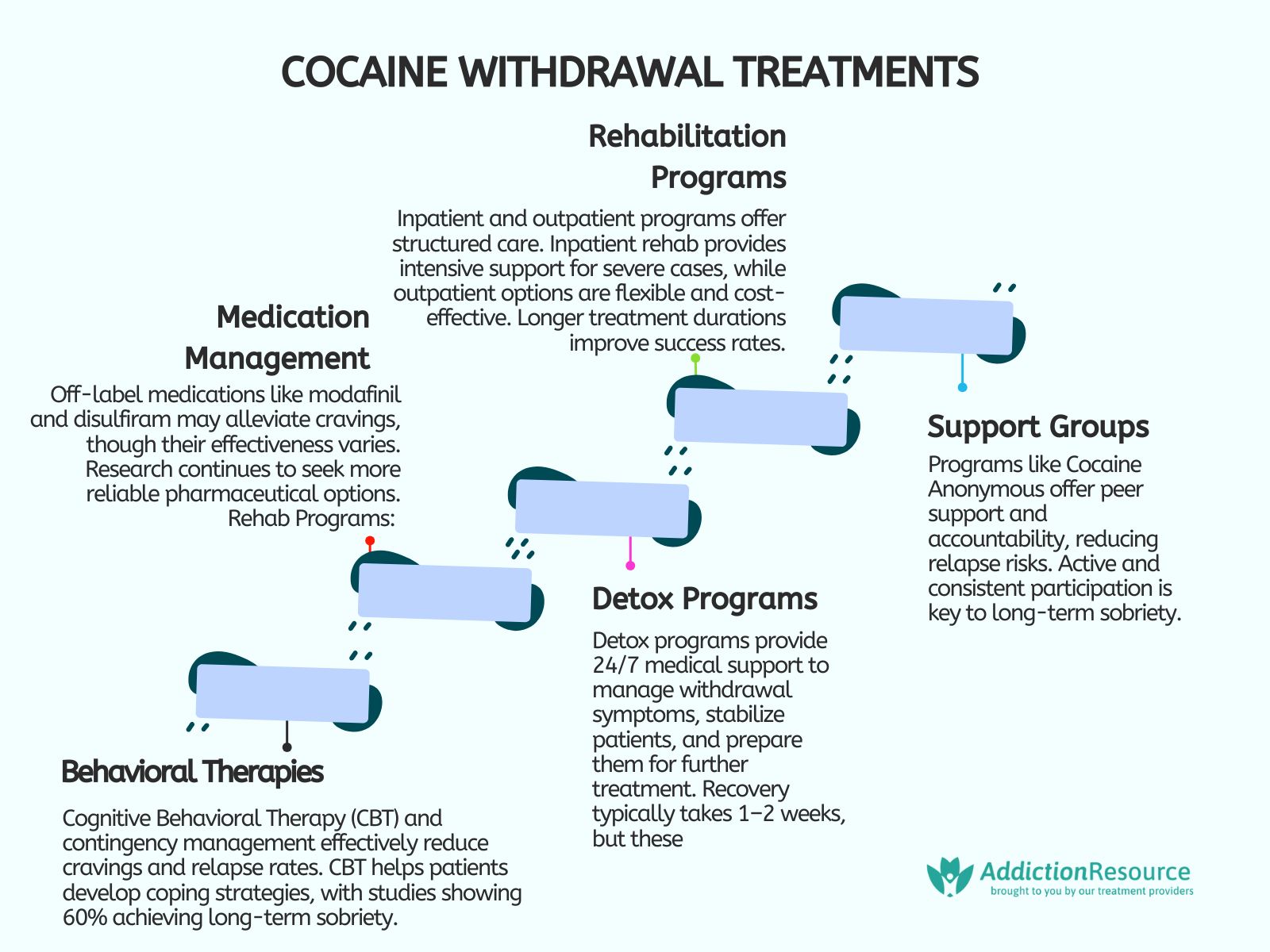
The treatment options for cocaine withdrawal include detox programs, behavioral therapies, medication management, and comprehensive rehab programs. These approaches address both the physiological and psychological challenges of withdrawal, aiming to reduce symptoms and prevent relapse.
The treatment options for cocaine withdrawal are as follows:
- Detox Programs: Medical detox programs help safely manage acute withdrawal symptoms by providing 24/7 monitoring and medical support. These programs focus on stabilizing patients, ensuring they are physically ready for further treatment. Detox programs offer a controlled environment and professional care, but this comes at high costs. Recovery times in detox programs range from 1 to 2 weeks for acute symptoms.
- Behavioral Therapies: Cognitive-behavioral therapy (CBT) and contingency management are effective psychological interventions. These therapies help patients identify and modify triggers for cocaine use and develop coping strategies. Studies show that CBT significantly reduces cravings, relapse rates, and long-term efficacy, though success relies on patient commitment. In a survey by Rawson RA et al. 2002, titled “A comparison of contingency management and cognitive-behavioral approaches during methadone maintenance treatment for cocaine dependence,” researchers examined the effectiveness of two psychosocial treatments for cocaine addiction. Results showed that 60% of patients in the cognitive-behavioral therapy (CBT) condition achieved clean toxicology screens at a 52-week follow-up.
- Medication Management: While no FDA-approved medications exist for cocaine addiction, off-label use of drugs like modafinil or disulfiram has shown promise. These medications alleviate cravings and support abstinence. These medicines help with symptom reduction, but their effectiveness varies among individuals. Research is ongoing to find more reliable pharmaceutical solutions.
- Rehab Programs: Rehabilitation programs for cocaine addiction include inpatient and outpatient options, both of which provide structured care but differ in intensity and setting. Inpatient rehab offers 24/7 medical supervision and a controlled environment, making it suitable for severe cases or those with co-occurring disorders. Outpatient rehab, including intensive outpatient programs (IOPs), allows individuals to attend therapy sessions while maintaining daily responsibilities like work or family commitments. Studies indicate that the success rate for rehab programs in addressing cocaine addiction is around 50-60%, with IOPs achieving slightly higher success rates of 60-70%, as shown in “Outpatient Programs: Assessing the Evidence.” While inpatient programs provide comprehensive support, they are costly and time-intensive. Outpatient programs are more flexible and cost-effective but are less suitable for individuals requiring intensive care or facing high-risk environments. Both approaches are most effective when combined with long-term support and follow-up care.
- Support Groups and Aftercare: Programs like Cocaine Anonymous and SMART Recovery provide peer support and ongoing accountability. These groups are valuable for maintaining sobriety and addressing long-term challenges. While they offer significant emotional support, their success depends on active participation. In a study of 1,605 cocaine-dependent patients conducted by Simpson DD et al. 1999, titled “A national evaluation of treatment outcomes for cocaine dependence,” from various treatment programs across the U.S., researchers found that 23.5% of patients continued weekly cocaine use in the year following treatment, a significant reduction from the 73.1% reported before admission. Additionally, 18% of patients returned to another drug treatment program. The study showed that those with more severe problems at intake had a higher likelihood of relapse, while those who stayed in treatment for longer periods (90 days or more) had better outcomes. Shorter treatment durations were associated with higher relapse rates.
What are the Coping Strategies for Cocaine Withdrawal?
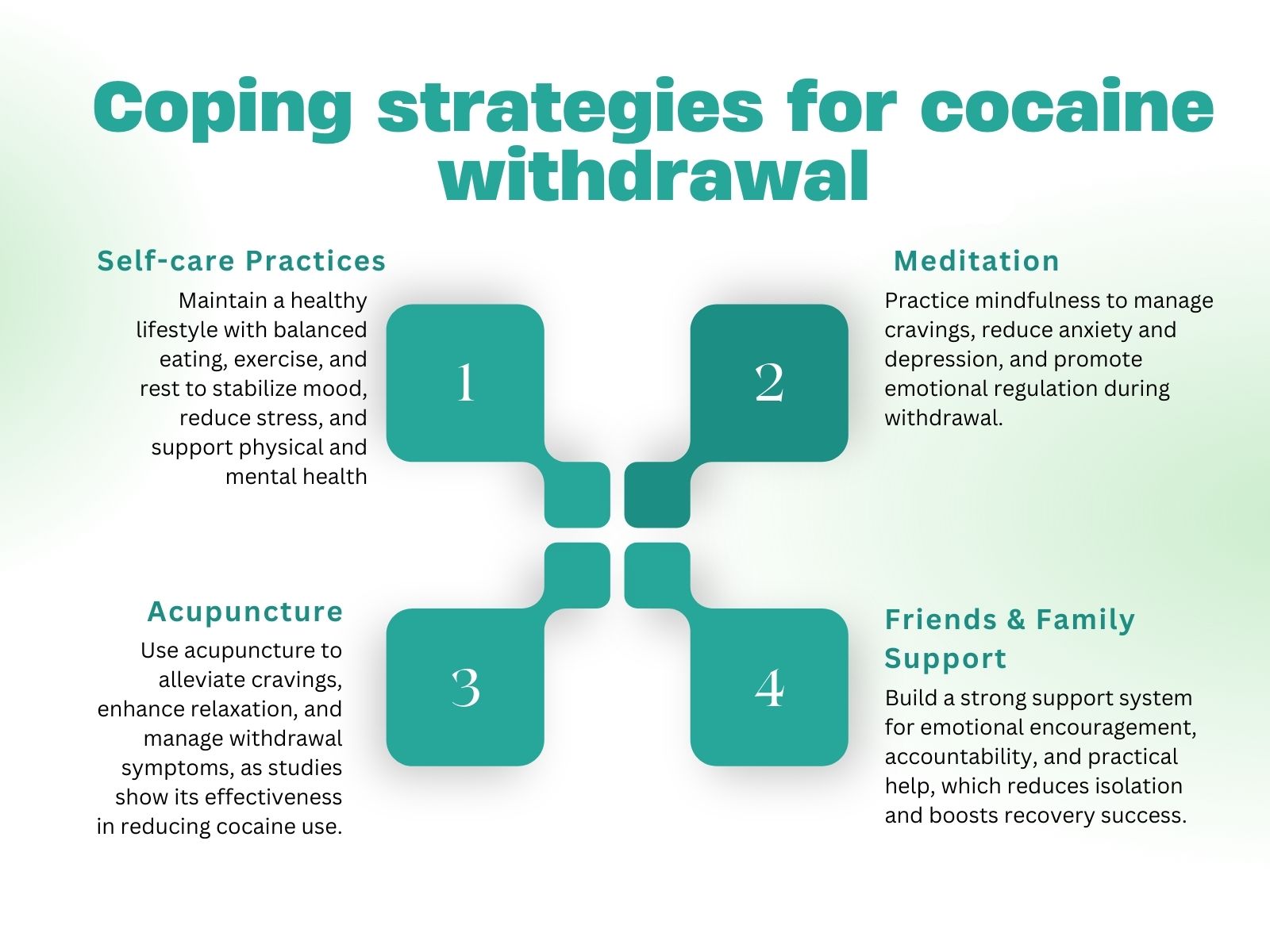
The coping strategies for cocaine withdrawal include building a strong support network, practicing stress-management techniques, and seeking professional help through therapy or support groups. These strategies help individuals manage withdrawal symptoms, reduce cravings, and maintain sobriety during recovery. Addressing both physical and psychological aspects of withdrawal is necessary for long-term success.
The coping strategies for cocaine withdrawal are as follows:
- Self-care Practices: Engaging in self-care practices such as healthy eating, exercise, and rest is important during cocaine withdrawal. A balanced lifestyle helps stabilize mood, reduces stress, and improves physical and mental health. Self-care promotes a sense of control and well-being during the recovery process.
- Meditation: Meditation involves focusing the mind to achieve relaxation and mindfulness. Meditation has been shown to reduce anxiety, depression, and stress, all of which are common during cocaine withdrawal. Regular meditation practice helps individuals manage cravings, improve emotional regulation, and maintain a calm mindset during recovery, as studied by Priddy SE et al. 2018, in “Mindfulness Meditation in the Treatment of Substance Use Disorders and Preventing Future Relapse: Neurocognitive Mechanisms and Clinical implications.”
- Acupuncture: Acupuncture, an alternative therapy involving the insertion of thin needles into specific points of the body, has been used to reduce withdrawal symptoms. Studies suggest that acupuncture helps alleviate cravings, manage pain, and enhance overall relaxation, aiding in the detoxification process. A study by Margolin A. et al. 2002, titled “Acupuncture for the treatment of cocaine addiction: a randomized controlled trial,” assessed acupuncture for cocaine addiction treatment. 620 patients were randomly assigned to either auricular acupuncture, needle insertion, or relaxation control conditions. The results showed a significant reduction in cocaine use across all groups, with an odds ratio of 1.40. Treatment retention rates were similar across all groups, with 44%-46% of patients completing the 8-week program.
- Friends & Family Support: Strong social support is necessary to overcome addiction. Friends and family offer emotional encouragement, help the individual stay accountable, and provide practical assistance during the recovery process. A supportive environment increases the likelihood of success by reducing feelings of isolation and promoting positive behavior changes.
What is Cocaine Addiction?
Cocaine addiction is a chronic condition characterized by the compulsive use of cocaine despite its harmful effects on an individual’s physical, mental, and emotional well-being. Cocaine, a powerful stimulant drug, increases levels of dopamine in the brain, leading to heightened feelings of euphoria, energy, and alertness. However, this temporary high quickly develops into dependence, with individuals needing more of the drug to achieve the same effects, resulting in a cycle of addiction. Over time, cocaine use leads to physical and psychological dependence, as users experience cravings, withdrawal symptoms, and difficulty stopping use even when it adversely impacts their lives. Cocaine addiction severely affects an individual’s health, relationships, and ability to function in daily life.
What Does Cocaine Withdrawal Feel Like?
Cocaine withdrawal feels like a combination of intense psychological and physical discomfort. Individuals experience symptoms like fatigue, depression, anxiety, irritability, and cravings for the drug. Physically, there are muscle aches, changes in appetite, and sleep disturbances, including insomnia or hypersomnia. The severity of these symptoms varies, with some people feeling intense emotional distress and difficulty concentrating, making the process of quitting cocaine challenging. Withdrawal symptoms begin within hours of the last dose and last anywhere from a few days to several weeks, depending on the individual’s level of dependence and usage history.
How Does Cocaine Withdrawal Compare with Crack Withdrawal?
Cocaine withdrawal compares with crack withdrawal in terms of the nature of symptoms, but crack withdrawal tends to be more intense and occurs more rapidly. Crack cocaine is a more potent, fast-acting form of the drug, leading to a quicker onset of withdrawal symptoms. Both forms of cocaine cause cravings, depression, fatigue, and anxiety, but crack cocaine withdrawal is associated with stronger, more acute psychological symptoms and a higher likelihood of relapse. Individuals withdrawing from crack cocaine also experience more severe physical symptoms, including increased heart rate and agitation, due to the faster and more intense effects of crack.
Can Using Cocaine Once Cause Withdrawal?
No, using cocaine once is unlikely to cause withdrawal symptoms. Cocaine withdrawal occurs after repeated, long-term use, as the body becomes dependent on the drug to function normally. A single-use causes a temporary crash characterized by feelings of fatigue or irritability, but this is not considered a withdrawal. Withdrawal symptoms develop after a period of sustained cocaine use, which leads to the brain and body adapting to the drug’s presence. The more frequent and prolonged the use, the more likely it is that withdrawal symptoms will occur.
What are the Complications of Cocaine Withdrawal?
The complications with cocaine withdrawal include severe depression, suicidal thoughts, and relapse. Cocaine withdrawal induces intense cravings and mood swings, making it difficult for individuals to stay off the drug. Additionally, some people experience cognitive impairments, such as difficulty concentrating and making decisions, which hinder their ability to recover. Prolonged withdrawal also leads to a high risk of relapse, especially if a person has co-occurring mental health conditions like anxiety or depression. A study by McElroy et al. 1995 found that relapse rates are significantly higher for individuals with underlying psychiatric disorders. Therefore, it’s important for people going through withdrawal to have support systems in place, including therapy and medical assistance, to manage these complications effectively.
How Severe is Cocaine Withdrawal Compared to Other Drugs?
Cocaine withdrawal is less physically severe compared to other drugs like opioids or alcohol, as it primarily affects the psychological state, leading to symptoms such as depression, fatigue, and intense cravings. However, cocaine withdrawal is still challenging due to the emotional distress and difficulty in managing cravings. The withdrawal from opioids or alcohol, in contrast, involves more severe physical symptoms, such as sweating, shaking, and even life-threatening complications like seizures or delirium tremens. Cocaine withdrawal, while not life-threatening, leads to long-lasting mental health issues, making it particularly difficult to manage without proper support and treatment.
How Does Cocaine Withdrawal Differ from Crystal Meth Withdrawal?
Cocaine withdrawal differs from crystal meth withdrawal in the intensity and duration of symptoms. While both drugs cause cravings, fatigue, and depression, methamphetamine withdrawal tends to be more prolonged and physically taxing. Meth withdrawal involves severe emotional and psychological symptoms, including paranoia and anxiety, which last for several weeks. Cocaine withdrawal, on the other hand, peaks within the first few days and gradually diminishes, with less intense physical symptoms.
How Soon After Stopping Cocaine Use Do Withdrawal Symptoms Begin?
Cocaine withdrawal symptoms begin within hours after the last use, with the acute phase occurring within 24 to 72 hours. The withdrawal symptoms start with cravings, fatigue, and irritability, followed by more intense psychological effects like anxiety and depression. The severity and onset vary depending on the frequency of use, dosage, and the individual’s health status. Medline Plus shows that while physical symptoms like increased appetite and sleep disturbances start quickly, emotional and psychological symptoms persist for weeks, gradually improving over time.
How to Quit Cocaine?
To quit cocaine, seeking professional help is necessary, which includes detox programs, therapy (such as Cognitive Behavioral Therapy), and support groups like Narcotics Anonymous. Gradual reduction of use, along with medical and psychological support, help manage withdrawal symptoms and prevent relapse.
Are There Any Long-term Effects of Cocaine Withdrawal?
Yes, there are long-term effects of cocaine withdrawal. These include ongoing psychological symptoms such as depression, anxiety, and fatigue, which last for weeks or even months. Cognitive and emotional recovery continues for extended periods, requiring long-term support, as studied by Science.org, Elizabeth Norton 2012, titled “Cocaine May Age the Brain.”
What is Neonatal Abstinence Syndrome?
Neonatal Abstinence Syndrome (NAS) is a condition that occurs in newborns who were exposed to drugs, like cocaine, in the womb. It involves withdrawal symptoms such as tremors, irritability, feeding problems, and seizures and requires specialized medical care, as studied by Mayo Clinic, 2024.
What is the “Crash” Phase of Cocaine Withdrawal?
The crash phase of cocaine withdrawal is the initial period, usually within the first 24 to 72 hours when users experience intense fatigue, depression, and cravings as the body reacts to the absence of the drug.
Can Cocaine Withdrawal Cause Depression or Suicidal Thoughts?
Yes, cocaine withdrawal can cause depression or suicidal thoughts. Intense psychological symptoms, including depression and anxiety, are common during the withdrawal process, particularly in the early stages, as studied by the National Institute on Drug Abuse (NIDA).
What is the Difference Between Acute and Protracted Withdrawal in Cocaine Detox?
The main difference between acute and protracted withdrawal in cocaine detox is that acute withdrawal occurs in the first few days with physical symptoms like fatigue and cravings, while protracted withdrawal lasts for weeks or months, primarily affecting mood and emotional stability.
Hope Without Commitment
Find the best treatment options. Call our free and confidential helpline
Most private insurances accepted
Find Drug Rehabilitation Centers Near You Anywhere In the US
Addiction Resource team has compiled an extensive list of the top drug rehabilitation facilities around the country. Use our locator tool to find the best centers near you.


 Reviewed by:
Reviewed by: 

 FindTreatment.gov
FindTreatment.gov